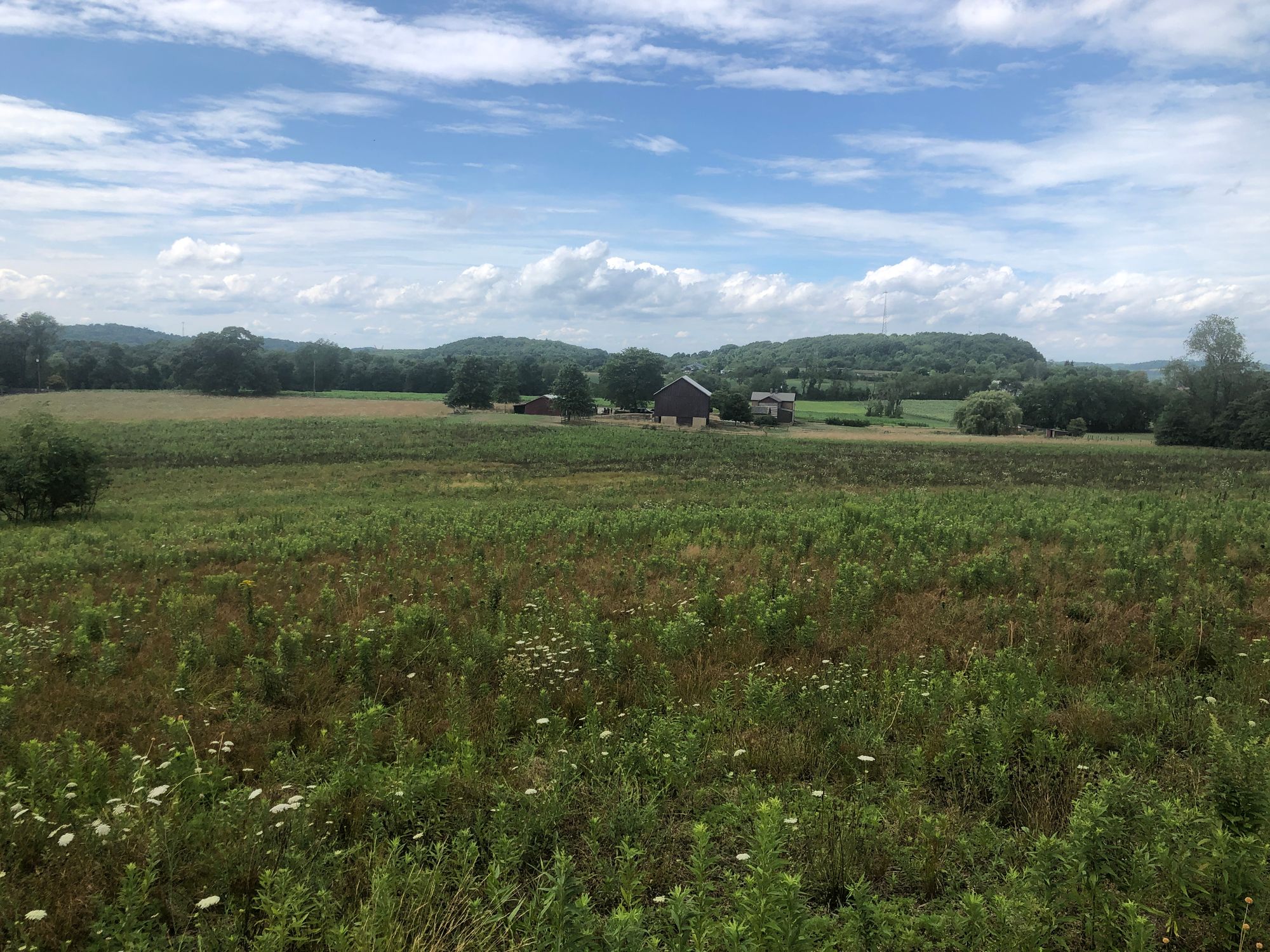Tree Talk, Vol. 2: Beating the Drum

I believe that trees are important.
I believe that humans have an impact on the world around us and that the world around us has an impact on us. We are interconnected. We are a part of a greater whole.
If you find yourself emotionally charged on this issue one way or another, forget the science and doomsday headlines for a minute.
Let's take a step outside and make some observations.
Can you observe evidence of humans disrupting natural processes? Are the landscapes that surround you impacted by humans in any way?
From where I stand, I see ample evidence of human beings having the capacity to disrupt natural systems.
Next, let's evaluate the degree of impact.
Are we making small changes or big changes? Are we aiming for harmony or dominance?
I see big changes.
I see a food system that is rooted in the destruction of every living thing on the land, then replacing what once had many living things with a single species.
Now let's reflect on whether this matters.
Do natural processes matter? Do the cycles of living systems have any bearing on our lives? Do we benefit from balanced cycles that result in clean air and water?
As part of my belief that we are a part of something bigger than us, I also believe that the answers to the last three questions are a clear yes.
Should we ignore the impact we are having because the status quo is cheap calories and excess consumption? Or should we disrupt the slow descent to an inactive commonplace*, question everything, and bring forth something new?
(*Readers who have been here from the beginning will recognize that language from an early article that discussed something called process philosophy. I'll link to that at the end of this post. It's a good one to read.)
Let's back up and take a look at how we got here.
If we are in fact at a turning point and need to start doing something different, I think it is important to understand what is changing and why. Where did we go wrong? What about our perspective needs to shift in order to "see" the way forward.
Humanity went down the corn and soy route for good reasons. Annual agriculture has been very useful for the development of civilization.
We took the natural world's bounty for granted though. We burned through resources based on an assumption that they are infinite. We took living capital and turned it into material capital at whatever rate technology would allow.
There are two worldviews at play here that I think are problematic. We approached the world as if natural resources were inexhaustible. We approached nature as if it were something to conquer.
For a long time, this was essentially true.
There was no amount of trees that was too much to cut when America was first "discovered".
There were seemingly infinite trees, and cutting them helped us grow.
Fast forward a century or two and imagine being a farmer after World War II.
Sales people were combing the country giving demonstrations of how much higher your yield could be if you used chemical fertilizers.
Talk to someone who was around back them. Many of them got free fertilizer to test on their fields.
The observable reality was clear. Fertilizing annual crops was going to change everything.
It did.
We doubled down on corn and soy.
Forget the concerns of soil loss that were creeping up at the beginning of the 1900's. The recipe for more food and wealth seemed simple: Buy a tractor, clear more fields, get more acreage, plant more seed, spray more fertilizer, and repeat.
From where I'm standing in 2023, I think both of these world views turned out to be wrong.
I believe that humans are not separate from nature and that natural resources are not inexhaustible. I believe that ignoring this reality has the potential to create bad results for humans.
I'm not really that concerned for nature.
Nature will find a way. Nature will fight monocultures with stronger pests. We are forcing nature to evolve. That evolution is well underway. Pests are evolving. Bugs, plants, bacterias, and fungi are becoming resistent to chemicals that once killed everything. We are in a race to evolve faster, but each iteration is requiring more and more energy use on our end.
How long can this go on?
Is there a point where we are consuming too much energy?
Is it possible to exhaust the finite resources that we were fortunate to find locked up under the earth's surface? What happens if we do? What happens if we run low on natural gas or oil? What happens if we can't make more nitrogen fertilizer? What happens if we fall short on an essential nutrient for corn?
I think there is a runway on how long we can maintain the status quo of annual agriculture.
I do not think our future is bleak though.
I think the solution is well within reach - a paradigm shift regarding our role within the natural world should do it.
Our role is not to conquer.
Our role is to steward.
Our role is to pursue what is true and good. Our role is to honor living systems. Our role is to celebrate diversity.
This perspective is what has led us to do all the things that we are doing, from the homestead to the farm to the tree planting.
We are not the first to come up with these ideas. We are only trying to do our part to spread them.
Part of this is identifying specific problems and helping to solve them.
Part of this is beating the drum of trees on farms.
This is an idea that needs more drummers. Compared to the amount of people who are talking about reforesting, there are comparitively few talking about trees on farms.
I think the "trees on farms" angle is important because farms represent a huge chunk of land that we could impact.
Outside of the sustainable agriculture community, few people have given any thought to trees on farms at all.
This includes the farmers and land owners who control the bulk of the hundreds of millions of acres of farmland in the US alone.
This is changing, but every voice counts.
I'm on a mission to connect with everyone willing to have a conversation about what we've called the rewilding process. This means humans living in harmony with nature. This means recognizing our role within, not outside of, the natural world. This means accepting our role as stewards.
There are other manifestations of all this, but trees on farms is one of the big ones we're focusing on. This seems to be a specific idea that's time has come.
These conversations have helped me identify 5 main challenges to getting more trees planted on farms:
- There is limited awareness of the benefits of trees.
- There is limited documentation regarding planning and good design, including financial modeling.
- Getting good results with trees requires careful design and few people are providing this service.
- Planting trees takes a lot of time.
- There is a lack of funding opportunities (+ financial disincentives!)
When considered in this context, it is not surprising that we don't have many people lining up to plant trees yet.
Many farmers are not in a financial position to sacrifice their economy for ecology.
If they hear anything about planting trees, it is usually framed as something that must be done to "save the environment". They view messages about saving the environment as out of touch with the reality of their need to cash flow or lose their land.
If you get someone interested, the lack of good financial models increases the risk in going down this path. A farmer knows roughly what corn will pay next year. He knows how much beef he can raise. The only number that is clear and consistent for trees is the cost.
The flipside to all challenge is opportunity though.
We are beings with engineering opportunities.
We have the capacity to help bring about the paradigm shift that is needed.
Everyone reading this can be part of the solution.
Everyone reading this can help spread a vision of humanity living in harmony with the rest of the natural world. We can all help engage farms in the rewilding process by choosing to source more of our food from perennial models.
We can all help plant more trees.
Tomorrow I will share some more details on how we plan to leverage these opportunities. Thins includes the design process we plan to help implement and how you can help us plant a lot of trees over the coming year.
Speaking of tree planting, I'd like to come up with a goal.
How many trees should we aim to plant?
Who wants to help? It's time to start scheduling tree planting parties.
The network of farmers I know who want to plant trees is growing - there is no shortage of opportunity.
For context, we are going to plant well over 1000 just on this farm this year.
If we raise some money and throw some tree planting parties, how many trees could we plant? I just saw an article about the world record holder planting over 20000 trees in 24 hours.
How many can we plant if we all band together?
Tree talk continues tomorrow!
Life is good.
P.S. I appreciate feedback and sharing. You can email me at dylan.heagy@gmail.com for right now. I will set it up so you can reply to the email soon.
